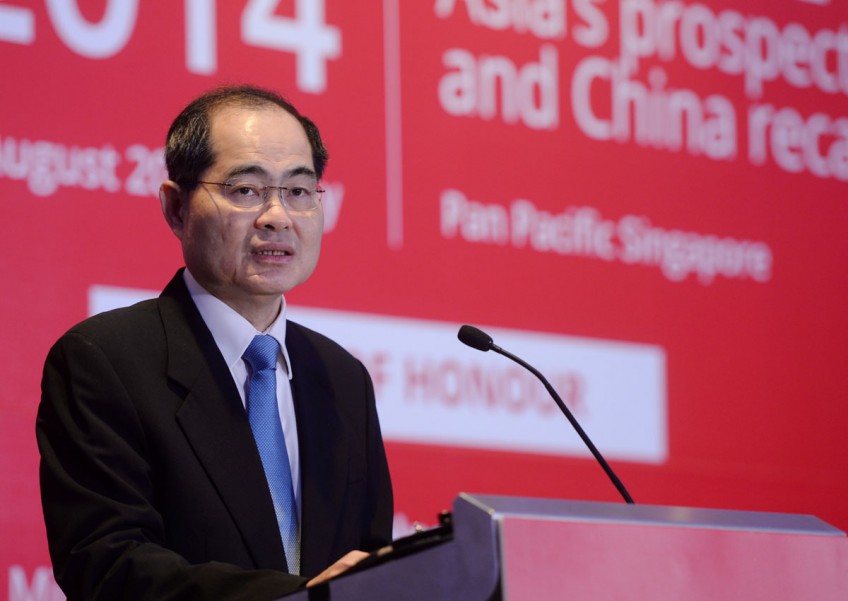Global economic uncertainty to last for next 3-5 years: Lim Hng Kiang

SINGAPORE'S government expects global economic uncertainty to weigh on the country's growth until the end of the decade, and it is ready to provide more help when necessary, said Trade Minister Lim Hng Kiang.
Even so, the government continues to fashion Singapore's external environment through trade agreements, and is making efforts to help companies and specific sectors to overcome challenges.
In responding to questions from Members of Parliament on Thursday about the Ministry of Trade and Industry's (MTI) plans for expenditure in financial year 2016, Mr Lim gave a clear indication of how long the current volatility is expected last.
Noting that the International Monetary Fund has been downgrading its global growth forecast almost every year since the Global Financial Crisis, Mr Lim said Singapore is now in a "paradigm of slower growth".
"Meanwhile, there are significant global rebalancing forces that must work themselves out over the next three to five years," he said.
"The government is watching the situation very closely, and we are prepared to take further action, if necessary," he added.
The expected normalisation of monetary policies by central banks around the world is expected to rock the global economy in the coming years.
Mr Lim said that the low interest rates - some even negative - are "unsustainable" in the long run.
As these rates normalise, financial and currency markets and capital flows will be affected, he said.
Uncertainty over global oil prices will destabilise the global economy in the coming years, said Mr Lim.
This is due to too much investment in oil, which has resulted in an oversupply. As a result, global oil supply and prices will continue to adjust.
China's economic transition is another issue that will be a drag on Singapore's growth, noted Mr Lim, while Singapore's demographic challenges will see the economy having to adjust to a tighter supply of labour.
"The factors above point to an uncertain economic environment for the next few years. Against this backdrop, we expect Singapore's economic growth to remain modest at 1 to 3 per cent this year," he said.
But improved access overseas presents opportunities for Singapore to overcome these challenges, as they will increase demand for the country's goods and services, said Mr Lim, in response to queries from Liang Eng Hwa, MP for Holland-Bukit Timah GRC.
The enactment of the Trans-Pacific Partnership (TPP) agreement would significantly brighten prospects for Singapore's external economy, and its passage now seems to hinge largely on the United States ratifying it.
The TPP can be passed if at least six countries, representing at least 85 per cent of the total economic output of the original 12 that inked the agreement, ratify it. Given their size, both the US and Japan would need to ratify the agreement.
While Mr Lim expressed optimism with the progress that the Japanese have made, he was more reserved about the TPP's chances in the US.
While US officials have said that they have a good sense of the possible number of votes the TPP can get in the Congress and Senate, they are now trying to predict how this might change with the coming US presidential elections.
"We are watching the developments," said Mr Lim.
The expected benefits the TPP can bring to Singaporean exports are enormous, as its "regional cumulation" effect will allow Singaporean exports to enjoy strong competitive advantage that current free trade agreements are unable to provide, Mr Lim noted.
Should the TPP come into force, members of other regional agreements like the Regional Comprehensive Economic Partnership (RCEP) - which include Singapore and other TPP signatories - will feel pressurised to ratify them too, said Mr Lim.
"Our trade policy should be inclusionary; we should not be left out, because we want market access to as many markets as possible," he said, responding to MP for Aljunied GRC Low Thia Khiang.
Domestically, MTI will work with companies to help them through the next few years.
It has introduced schemes like the SME (small and medium enterprises) Working Capital Loan and Automation Support Package to help firms overcome growth challenges.
The ministry is also working with trade associations and chambers to drive 30 Collaborative Industry Projects (TAC-CIP) over the next three years, which will help more than 3,000 SMEs, said Mr Lim.
soonwl@sph.com.sg

This article was first published on April 8, 2016.
Get The Business Times for more stories.